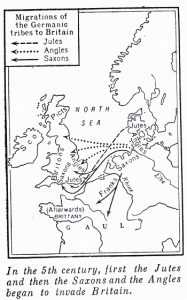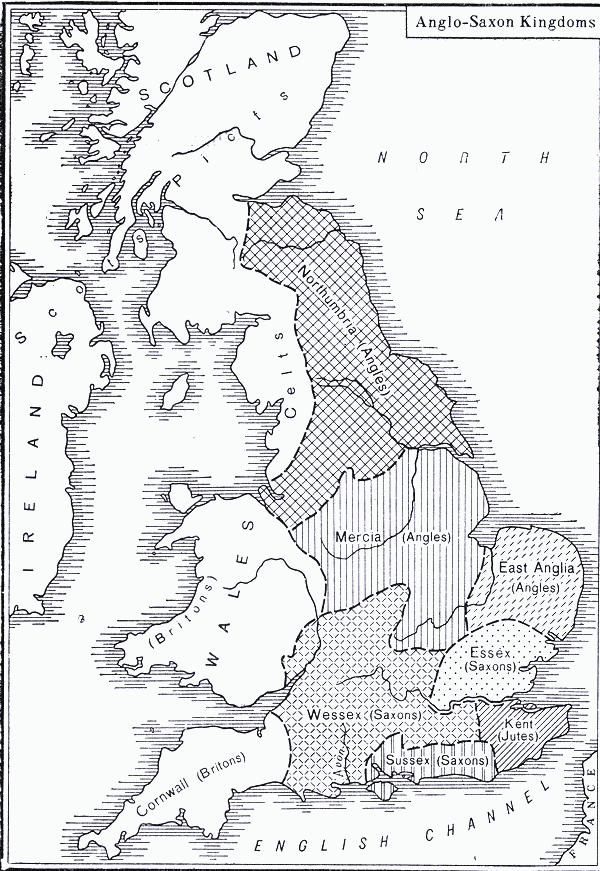THE ANGLO-SAXON CONQUEST OF BRITAIN
Category: 05th centuryThe Romans protected their province of Britain against the barbarian tribes until they left which was at the beginning of the 5th century.
In the middle of the 5th century the Anglo-Saxons, Germanic tribes, invaded Britain.
The Anglo-Saxon conquest is regarded as the beginning of medieval history in Britain.
The Anglo-Saxons were the ancestors of the English.
As a result of the conquest they formed the majority of the population in Britain.
Here is the story of the Anglo-Saxon conquest of Britain.
 After the Roman legions left Britain the Celts remained independent but not for long. From the middle of the 5th century they had to defend the country against the attacks of Germanic tribes from the Continent. In the 5th century, first the Jutes and then other Germanic tribes—the Saxons and the Angles began to migrate to Britain. The Saxons came from the territory lying between the Rhine and the Elbe rivers which was later on called Saxony. The Jutes and the Angles came from the Jutland Peninsula. At first they only came to plunder. They would land from their boats, drive off and slay the cattle, seize the stores of corn, and be off again to sea before the Celts could attack them. But after some time they returned again and again in larger numbers, and began to conquer the country.
After the Roman legions left Britain the Celts remained independent but not for long. From the middle of the 5th century they had to defend the country against the attacks of Germanic tribes from the Continent. In the 5th century, first the Jutes and then other Germanic tribes—the Saxons and the Angles began to migrate to Britain. The Saxons came from the territory lying between the Rhine and the Elbe rivers which was later on called Saxony. The Jutes and the Angles came from the Jutland Peninsula. At first they only came to plunder. They would land from their boats, drive off and slay the cattle, seize the stores of corn, and be off again to sea before the Celts could attack them. But after some time they returned again and again in larger numbers, and began to conquer the country.
In 449 the Jutes landed in Kent and this was the beginning of the conquest. The British natives fought fiercely against the invaders and it took more than a hundred and fifty years for the Angles, the Saxons and the Jutes to conquer the country. Other Germanic tribes conquered the Roman provinces on the Continent without any serious resistance as the bulk of the population in the provinces occupied by the Romans welcomed the Germanic conquerors as their liberators. But the British Celts were free at the time and their resistance was often stubborn and prolonged. In the South-East the Celts were soon overwhelmed, but in the western parts of the country they offered stout resistance for many years. Now and then the Celts won and the invaders were forced back. As a result Britain held out longer than the other provinces of the Roman Empire. It was only by the beginning of the 7th century that the invaders managed to conquer the greater part of the land.
The final refuge of the Celts was Cornwall and Wales — the mountainous districts of the West — and the northern part of the island (Scotland) where the Celts were still living in tribes and, later on, some independent states were formed. The Celts of Ireland remained independent too.
In the course of the conquest many of the Celts were killed, some were taken prisoners and made slaves or had to pay tribute to the conquerors. Some of the Celts crossed the sea to the North-West of France and settled in what was later on called Brittany after the Celtic tribes of Britons.
Descendants of the ancient British Celts can be found in Brittany today.
By the end of the 6th and the beginning of the 7th century several kingdoms were formed on the territory of Britain conquered by the Germanic tribes. (This territory later on became England proper.) Kent was set up by the Jutes in the South-East. In the southern and the southeastern parts of the country the Saxons formed a number of kingdoms—Sussex (the land of the South Saxons), Wessex (the land of the West Saxons) and Essex (the land of the East Saxons). Farther north were the settlements of the Angles who had conquered the greater part of the country. In the North they founded Northumbria, which has left its name in the present county of Northumberland; Mercia was formed in the Middle, and East Anglia—in the East of England, north of the East Saxon kingdom. These kingdoms were hostile to one another and they fought constantly for supreme power in the country.
The new conquerors brought about changes altogether different from those that had followed the conquest of the country by the Romans. The new settlers disliked towns preferring to live in small villages. In the course of the conquest they destroyed the Roman towns and villas. All the beautiful buildings and baths and roads were so neglected that they soon fell in ruins. Sometimes the roads were broken up, the stones being used for building material. Thus the art of road-making was lost for many hundreds of years to come.
The Jutes, the Saxons and the Angles were closely akin in speech and customs, and they gradually merged into one people. The name “Jute” soon died out and the conquerors are generally referred to as the Anglo-Saxons.
As a result of the conquest the Anglo-Saxons made up the majority of the population in Britain and their customs, religion and languages became predominant. They called the Celts “welsh” which means foreigners as they could not understand the Celtic language which was quite unlike their own. But gradually the . Celts who were in the minority merged with the conquerors, adopted their customs and learned to speak their languages. Only the Celts who remained independent in the West, Scotland and Ireland spoke their native tongue.
At first the Anglo-Saxons spoke various dialects but gradually the dialect of the Angles of Mercia became predominant. In the course of time all the people of Britain were referred to as the English after the Angles and the new name of England was given to the whole country. The Anglo-Saxon language, or English, has been the principal language of the country since then although it has undergone great change.

